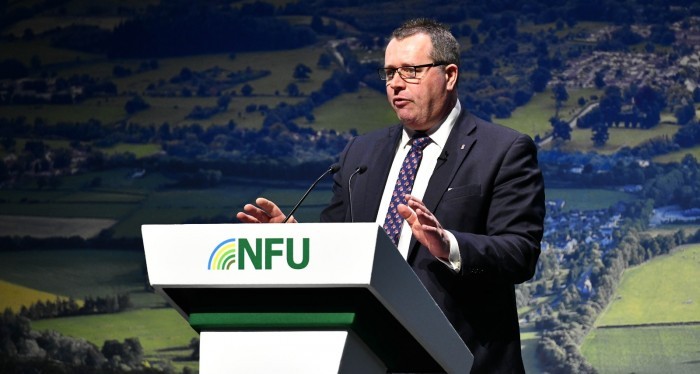Farming Minister Mark Spencer has announced new funding to support small abattoirs, as he also unveiled more details on £168 million in grants that will be available to farmers this year.
Mr Spencer made the announcements at the NFU’s annual conference in Birmingham on Tuesday morning, where he came under fire from NFU president Minette Batters and delegates on various aspects of Government policy, including the lack of robust controls on meat imports.
He unveiled Government plans to introduce funding to promote enhanced productivity, innovation and improved animal health and welfare in smaller abattoirs.
There has been concern over the viability of small abattoirs for many years, highlighted by a 20% reduction in the number of low-capacity abattoirs in the last decade, often making it harder for livestock farmers to find viable outlets.
Mr Spencer said: “If farming is to flourish then we need to get the fundamentals right – abattoirs are key to the food supply chain and there is clearly a need to support smaller providers in this area.
“The availability of funding will help abattoirs to invest in new technology and improve productivity and animal health and welfare, allowing our agriculture sector to get its high-quality produce to market.”
“A network of smaller abattoirs distributed around the country is crucial to supporting the rural economy, enabling farmers to sell their own meat in farm shops and maintaining good animal health and welfare through reduced journey times to slaughter.”
The minister met with the sector and discussed the issues they are facing at a recent roundtable. The new funding, to be announced in full later this year, will help those abattoirs to add value by supporting the availability of local produce, providing specific equipment to support the rearing of rare and native breeds, encouraging rural employment, and safeguarding the food supply chain through a diverse and productive abattoir sector, he said.
New grants
Commenting on the wider grant funding to be made available to farmers, Mr Spencer said they have been designed to support innovation, support food production, improve animal health and welfare and protect the environment. The grants will drive the development of new technology and innovative ways of farming, with a focus on practical solutions that advance food productivity and deliver significant environmental and animal welfare benefits, he said.
They will be delivered through the Farming Innovation Programme (FIP) and Farming Investment Fund (FIF), and will sit alongside the Environmental Land Management schemes which pay farmers for a diverse range of actions.
The grants will cover various investments, include improvements to slurry storage to further the efforts of farmers aiming to minimise their fertiliser use, robotic technology to support with harvesting, handling equipment and sensors on tractors to measure the levels of nutrients in soils.
He also outlined the new dedicated funding for annual vet-led health and welfare checks for livestock and money to support farmers implement improvements following these visits, recently been announced through the Animal Health and Welfare Pathway. Farmers interested in the vet visit can now register their interest.
Mr Spencer said: “The role farmers play in putting food on our tables as well as looking after our countryside is crucial. We know that sustainable food production depends on a healthy environment, the two go hand in hand.
“Helping farms invest in new technology as well as bringing in nature-friendly schemes will support the future of farming.”
Import controls
Mr Spencer highlighted the steps Defra had taken improve controls on meat imports to reduce the risk of diseases like African swine fever. This includes the move to ban on non-commercial meat imports over 2kg introduced in September.
However, he came in for heavy criticism from Mrs Batters and delegates over the Government’s continual delay in implementing full checks on meat imports from the EU, despite controls being in place on UK exports to the EU from the start of 2021.
He also came under pressure on the Government’s overall approach to food security and on the implications for UK farmers of the Australia and New Zealand trade deals, particularly in the wake of heavy criticism of the deals from former Defra Secretary George Eustice.
Mr Spencer insisted the deals were good for farmers, providing the opportunity to sell lamb to those countries.




